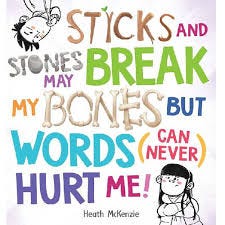As the dementia took over, my kind, thoughtful husband became verbally and emotionally abusive. Dan called me names, screamed and hollered, and was a challenge to live with. For 60 years, we got along beautifully; then, we fought constantly.
I didn’t do anything about the abuse for several reasons: a) I knew he would forget any conversation within five minutes, b) he didn’t realize that what he was doing was hurtful, c) we were in the middle of the pandemic with limited options, and d) it wasn’t physical, so I wasn’t thinking in terms of abuse.
However, this quote wasn’t true. Words do hurt even when you know better.
Many articles talk about caregivers abusing the patient, but fewer discuss patients abusing the caregiver.
The Problem
The Aging Care website says
Age and illness bring many complex emotions to the surface for seniors, who focus their anger, fear, frustration, and sadness on their caregivers.
The AARP website describes
A long-term pattern of care recipients who have been abusive to family members throughout adulthood, and now they’ve aged and need to receive care, but their habit is too strong.
The Kapok website says
Intentional caregiver abuse often involves manipulation, verbal abuse, and emotional abuse. The abuse is deliberate to the extent that the senior is aware and responsible for their actions. But, they might not view themselves as being abusive.
Being in this position can be confusing because the person exhibiting aggressive and violent behavior depends on you. A typical habit is that loving behavior follows the abusive behavior.
Physical violence is just one of many tactics used to control or dominate a person, and the abuser might be less likely to use it if the other tactics are successful.
Solutions
Numerous websites offer ideas for what a caregiver can do to protect themselves. In truth, many didn’t work for me. But check them out - they offer possibilities and may work for you.
The literature touches on three areas - distance oneself, set boundaries, develop a safety plan, and self-care. The Caregiver Action Network is an excellent place to start.
I took several actions, but they were mainly reactionary. If I were in a caregiving situation now, I would proceed differently.
Distancing Myself
At the time, Dan had no place to go. He was abusive with respite care people who came to the house and would only go out with our children. The first placement we tried couldn’t handle his behavior, and when we stayed at our daughter’s for a few weeks, he was even more belligerent.
I gave myself space by spending time in my office and using a phone app to monitor him. My excuse: “I was working.”
I took daily walks - again, I used the monitor. But then he lost track of time - so my half-hour walk seemed like all day - and he was furious.
When a situation became too contentious, I sat in the car or went out, but he didn’t remember I was gone or why.
Distancing is a good technique. Now I would
find a compatible in-home care provider
use additional apps to monitor him
learn to say no, and not feel guilty about it
maintain my boundaries. I had to know what I could and would do.
Setting boundaries
Setting boundaries didn’t work at the time. We would tell him how hurtful his words were. He would apologize profusely and repeat them five minutes later.
Still - setting boundaries is essential. Had I firmly identified my limits - my stance, voice, and being may have supported a more robust message.
A Safety Plan
So, in addition to walking away and improving my boundaries, I had a safety plan, which included talking to a trustworthy person and creating a support system. I also kept the car keys in my pocket at all times. I was afraid he would take them, lose them, or try to drive when it wasn’t safe for him to do so.
Now, I would also.
Create a code word as a “help signal” and share it with trusted people. They would know they should get help if they receive it.
Store important documents and items (e.g., identification, bank cards, cell phone) in a safe and convenient location - so I could grab them quickly in an emergency.
Reach out to community services for help. Our local Senior Center provides educational, recreational, and health-related services for adults aged 50 and up. It also offers case management, care planning, and referrals to community services for seniors and their families.
Self-Care
I wrote about caregivers and self-care recently. Take a look.
These four actions might have helped me protect myself better at the time.
If you want to contribute to my work, consider donating to the Alzheimer's Association. This link takes you to their website. The choice is yours.





Many articles talk about caregivers abusing the patient, but fewer discuss patients abusing the caregiver.
Really helpful insights ❤️